Education

Palestinians were always the most educated of the Arab peoples and they are determined to keep standards up. Many Palestinians are today running Jordan. It is wholly mistaken to think of Palestinians (or indeed Bedouins) as ‘primitive farmers’, even though they may be living in near Third World conditions. Not infrequently Palestinians have doctorates.
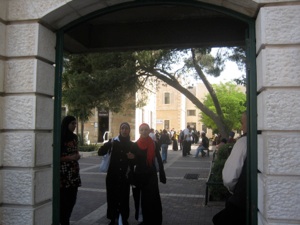
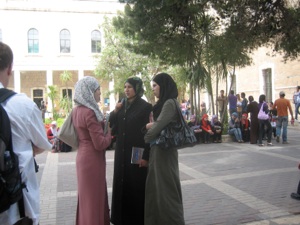
Universities
We visited the University of Bethlehem; founded by (Catholic) Christians in order that both Christians and Moslems - and the more especially Moslem women whom it was recognized had few opportunities - might get an education. Today the university has a majority of women students and (following the sharp decline in the of number of Christians in Bethlehem) is overwhelmingly Moslem. Students study a variety of subjects, including for example computer science. Some we met aspired to go abroad for further education. Students live in small groups, not in dorms, as it is much safer: the Israeli military has a propensity for attacking male dorms as a place where young men are congregated. The library had an interesting small museum/exhibition of Palestinian crafts and traditional handiwork. A map showing the separation barrier and confiscated Palestinian land dominated the space.
The students study under the most difficult conditions. One young man with whom we spoke had gone through the experience of having the house in which he lived demolished just before his examinations. Many students have to travel through checkpoints to reach to their classes; when one has to go through checkpoints one can never tell at what time one will arrive anywhere. During the second intifada (when Bethlehem was under siege) the university was able to keep open through people meeting in groups of 9 in people’s houses, a gathering of 10 or more being illegal. Israeli tanks invaded the campus. The library has preserved a hole in the wall where a shell went through: many valuable books were lost. This missile was of a type sent by remote control, in which case it could be known exactly what would be hit. In the courtyard there stood a plaque with the names of students killed by Israelis; in varied years I noted and, ominously, with space for further names below.
Schools
We visited a school for Palestinian girls in a run down area of East Jerusalem neglected by the authorities. The apartheid wall cuts it off from the surrounding area, strangling it socially. The (Israeli) authorities had demolished a house saying they wanted to build a (government) school. 7-8 years later they hadn’t built any school. The people built a playground. The authorities say they are going to demolish it: the case is undergoing appeal. A small school opened in 2006 with 120 girls in 4 classes. In 2007 they expanded the kindergarten and upper classes. Since 2008/9 they have had classes from kindergarten through to 12th grade (6th form). There are 440 children, including, in the kindergarten, boys.
The main goal was to establish a school in an area where there were no facilities for girls. There are two high schools and private schools; most people cannot afford to send their children, especially their girls, to private schools. In Palestinian families there tend to be 7-10 children. Among Arabs in Jerusalem 42% of the population is aged 15 or younger. The Vice-Principal commented that he thought that NGOs will eventually build schools, hospitals etc. for the Palestinians.
The facilities in this school were rudimentary. The Vice-Principal commented on how difficult it is to have a kindergarten, middle school and high school all in one small building. The school has no library. The staff commented on the difficulties of studying science without a laboratory, or maths without computers. They have a very small computer lab. They want a library, art room, outside court, a stage for drama etc. ‘We try to do a maximum from minimum.’ Their motto is: ‘We don’t cry: we do.’ The Israeli ministry of education gives only 75% of what it gives to a government school, part of which is for teachers’ salaries. They need to find 25%. They have extra-curricular activities and extra classes on Sunday for students who fall behind. They try to educate girls as to the disadvantages of early marriage and pregnancy and to keep them in full time education.
The school seemed to have a very happy atmosphere. With VSO in my mind, I asked whether it would be useful were a British person (even were s/he a non-Arabic speaker) to come and teach English. They would appreciate it even if only for a few weeks and even if non-Arabic speaking.
The University of Bethlehem
The School
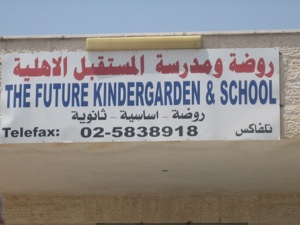
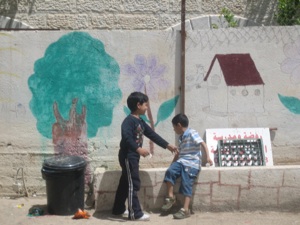
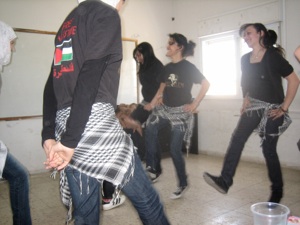
School Playground

English lesson
Susan Barry
Girls perform a dance for us